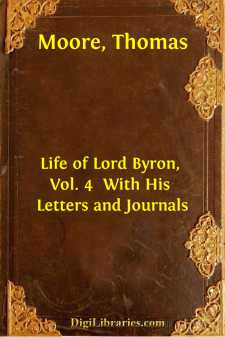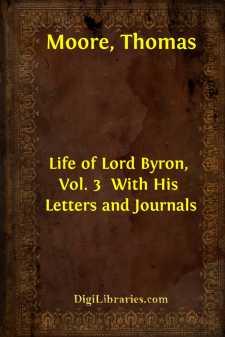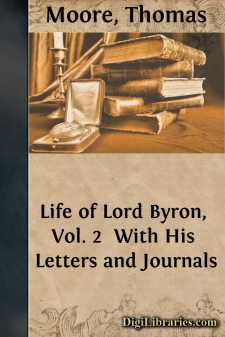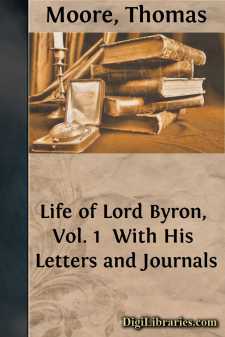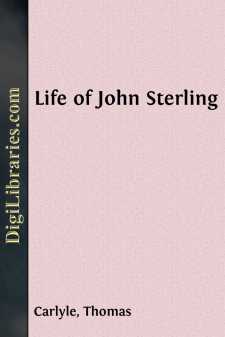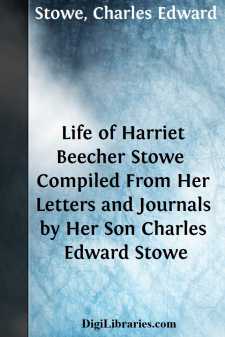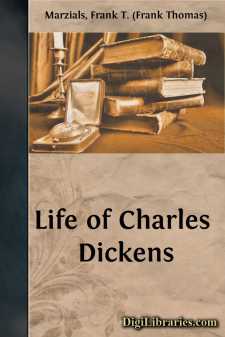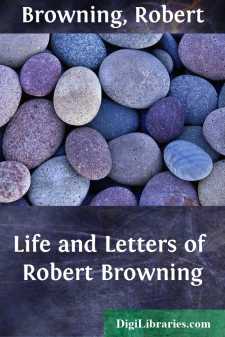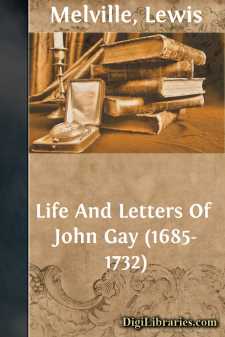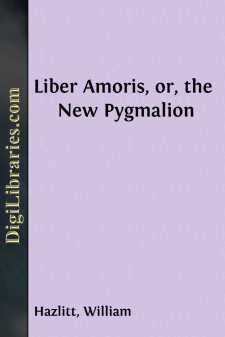Biography & Autobiography
- Adventurers & Explorers 15
- Artists, Architects, Photographers 16
- Business 2
- Composers & Musicians 14
- Criminals & Outlaws 5
- Editors, Journalists, Publishers 6
- Educators 1
- Entertainment & Performing Arts 3
- General 73
- Health, Exercise & Fitness 1
- Historians 3
- Historical 83
- Law Enforcement 1
- Lawyers & Judges 3
- Literary
- Medical 7
- Military 48
- Naturalists, Gardeners, Environmentalists 8
- Personal Memoirs & Diaries 226
- Philosophers 3
- Political 9
- Presidents & Heads of State 38
- Religious 38
- Rich & Famous 27
- Scientists 13
- Women 31
Literary Books
Sort by:
by:
Thomas Moore
LETTER 272. TO MR. MURRAY. "Venice, April 9. 1817. "Your letters of the 18th and 20th are arrived. In my own I have given you the rise, progress, decline, and fall, of my recent malady. It is gone to the devil: I won't pay him so bad a compliment as to say it came from him;—he is too much of a gentleman. It was nothing but a slow fever, which quickened its pace towards the end of its...
more...
by:
Thomas Moore
JOURNAL, 1814. "February 18. "Better than a month since I last journalised:—most of it out of London and at Notts., but a busy one and a pleasant, at least three weeks of it. On my return, I find all the newspapers in hysterics, and town in an uproar, on the avowal and republication of two stanzas on Princess Charlotte's weeping at Regency's speech to Lauderdale in 1812. They are...
more...
by:
Thomas Moore
NOTICES LIFE OF LORD BYRON. Having landed the young pilgrim once more in England, it may be worth while, before we accompany him into the scenes that awaited him at home, to consider how far the general character of his mind and disposition may have been affected by the course of travel and adventure, in which he had been, for the last two years, engaged. A life less savouring of poetry and romance...
more...
by:
Thomas Moore
NOTICES OF THE LIFE OF LORD BYRON. It has been said of Lord Byron, "that he was prouder of being a descendant of those Byrons of Normandy, who accompanied William the Conqueror into England, than of having been the author of Childe Harold and Manfred." This remark is not altogether unfounded in truth. In the character of the noble poet, the pride of ancestry was undoubtedly one of the most...
more...
by:
Thomas Carlyle
CHAPTER I. INTRODUCTORY. Near seven years ago, a short while before his death in 1844, John Sterling committed the care of his literary Character and printed Writings to two friends, Archdeacon Hare and myself. His estimate of the bequest was far from overweening; to few men could the small sum-total of his activities in this world seem more inconsiderable than, in those last solemn days, it did to...
more...
Harriet Beecher (Stowe) was born June 14, 1811, in the characteristic New England town of Litchfield, Conn. Her father was the Rev. Dr. Lyman Beecher, a distinguished Calvinistic divine, her mother Roxanna Foote, his first wife. The little new-comer was ushered into a household of happy, healthy children, and found five brothers and sisters awaiting her. The eldest was Catherine, born September 6,...
more...
CHAPTER I. Education is a kind of lottery in which there are good and evil chances, and some men draw blanks and other men draw prizes. And in saying this I do not use the word education in any restricted sense, as applying exclusively to the course of study in school or college; nor certainly, when I speak of prizes, am I thinking of scholarships, exhibitions, fellowships. By education I mean the...
more...
by:
Robert Browning
Chapter 1 Origin of the Browning Family—Robert Browning's Grandfather—His position and Character—His first and second Marriage—Unkindness towards his eldest Son, Robert Browning's Father—Alleged Infusion of West Indian Blood through Robert Browning's Grandmother—Existing Evidence against it—The Grandmother's Portrait. A belief was current in Mr. Browning's...
more...
by:
Lewis Melville
CHAPTER I 1685-1706EARLY YEARS The Gays were an old family, who settled in Devonshire when Gilbert le Gay, through his marriage with the daughter and heiress of Curtoyse, came into possession of the manor of Goldsworthy, in Parkham. This they held until 1630, when it passed out of their hands to the Coffins. Subsequently they were associated with the parish of Frittelstock, near Great Torrington. In...
more...
by:
William Hazlitt
THE PICTURE H. Oh! is it you? I had something to shew you—I have got a picture here. Do you know any one it's like? S. No, Sir. H. Don't you think it like yourself? S. No: it's much handsomer than I can pretend to be. H. That's because you don't see yourself with the same eyes that others do. I don't think it handsomer, and the expression is hardly so fine as yours...
more...


